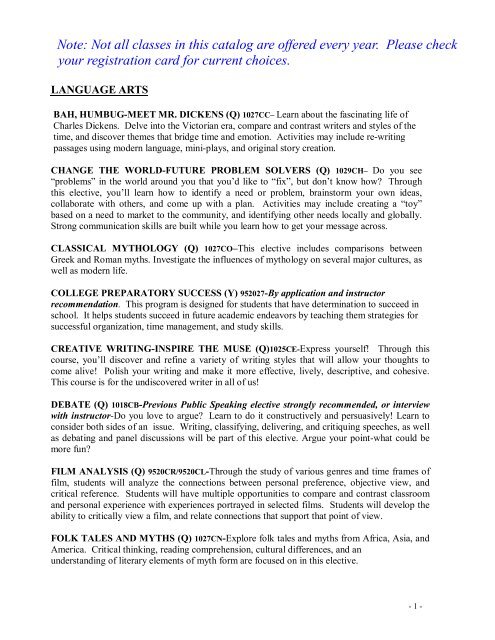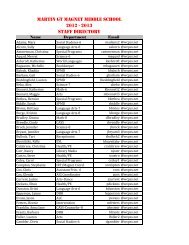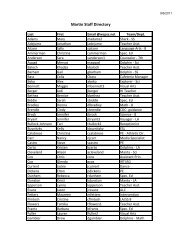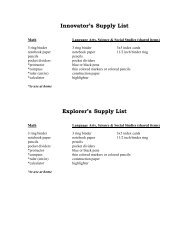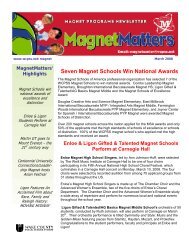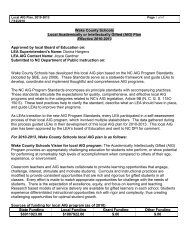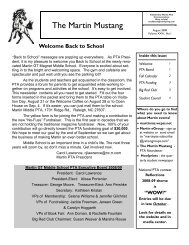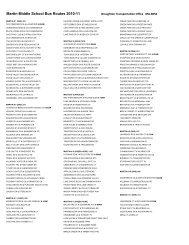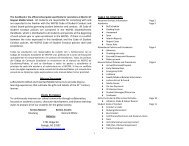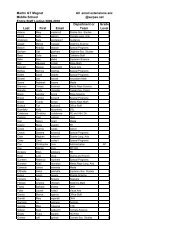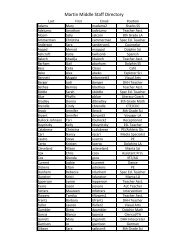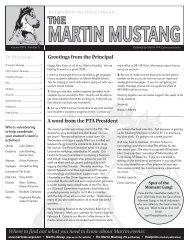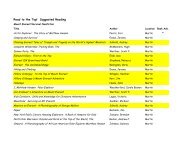CATALOG 0910.pdf - Martin Gifted & Talented Magnet Middle ...
CATALOG 0910.pdf - Martin Gifted & Talented Magnet Middle ...
CATALOG 0910.pdf - Martin Gifted & Talented Magnet Middle ...
Create successful ePaper yourself
Turn your PDF publications into a flip-book with our unique Google optimized e-Paper software.
Note: Not all classes in this catalog are offered every year. Please check<br />
your registration card for current choices.<br />
LANGUAGE ARTS<br />
BAH, HUMBUGMEET MR. DICKENS (Q) 1027CC– Learn about the fascinating life of<br />
Charles Dickens. Delve into the Victorian era, compare and contrast writers and styles of the<br />
time, and discover themes that bridge time and emotion. Activities may include rewriting<br />
passages using modern language, miniplays, and original story creation.<br />
CHANGE THE WORLDFUTURE PROBLEM SOLVERS (Q) 1029CH– Do you see<br />
“problems” in the world around you that you’d like to “fix”, but don’t know how? Through<br />
this elective, you’ll learn how to identify a need or problem, brainstorm your own ideas,<br />
collaborate with others, and come up with a plan. Activities may include creating a “toy”<br />
based on a need to market to the community, and identifying other needs locally and globally.<br />
Strong communication skills are built while you learn how to get your message across.<br />
CLASSICAL MYTHOLOGY (Q) 1027CO–This elective includes comparisons between<br />
Greek and Roman myths. Investigate the influences of mythology on several major cultures, as<br />
well as modern life.<br />
COLLEGE PREPARATORY SUCCESS (Y) 952027By application and instructor<br />
recommendation. This program is designed for students that have determination to succeed in<br />
school. It helps students succeed in future academic endeavors by teaching them strategies for<br />
successful organization, time management, and study skills.<br />
CREATIVE WRITINGINSPIRE THE MUSE (Q)1025CEExpress yourself! Through this<br />
course, you’ll discover and refine a variety of writing styles that will allow your thoughts to<br />
come alive! Polish your writing and make it more effective, lively, descriptive, and cohesive.<br />
This course is for the undiscovered writer in all of us!<br />
DEBATE (Q) 1018CBPrevious Public Speaking elective strongly recommended, or interview<br />
with instructorDo you love to argue? Learn to do it constructively and persuasively! Learn to<br />
consider both sides of an issue. Writing, classifying, delivering, and critiquing speeches, as well<br />
as debating and panel discussions will be part of this elective. Argue your pointwhat could be<br />
more fun?<br />
FILM ANALYSIS (Q) 9520CR/9520CLThrough the study of various genres and time frames of<br />
film, students will analyze the connections between personal preference, objective view, and<br />
critical reference. Students will have multiple opportunities to compare and contrast classroom<br />
and personal experience with experiences portrayed in selected films. Students will develop the<br />
ability to critically view a film, and relate connections that support that point of view.<br />
FOLK TALES AND MYTHS (Q) 1027CNExplore folk tales and myths from Africa, Asia, and<br />
America. Critical thinking, reading comprehension, cultural differences, and an<br />
understanding of literary elements of myth form are focused on in this elective.<br />
1
GREAT BOOKS (Q) 1010CHCourse most enjoyed by advanced readers. Reading and<br />
discussion, comprehension, logical and critical thinking processes, and literary interpretation will<br />
be taught through reading novels and/or short stories through books by the Jr. Great Books<br />
Foundation.<br />
ILLUSIONS (LITERARY MAGAZINE I/II) (S)1029CJBe a part of developing <strong>Martin</strong>’s<br />
award winning literary magazine through cooperative group processes. Review literary forms,<br />
compare and contrast, think critically, and evaluate the use of various literary styles.<br />
This literary magazine is completely created, formatted, and published by students taking this<br />
course.<br />
INTRODUCTION TO SIGN LANGUAGE (Q)1029CCIntroduction to sign language, manual<br />
alphabet, and sign vocabulary of 300400 words, as well as the history of signing,<br />
understanding of the hearing impaired and a means of communicating with hearing impaired<br />
persons will be studied.<br />
IT’S HILARIOUS (Q)1029CE Develop your “funny bone” through this course! Knowledge of<br />
the elements, levels, and forms of humor throughout history are explored through analysis of<br />
creative productions Appreciate the need and usefulness of humor, and develop your awareness<br />
of appropriate humor for different audiences.<br />
LOGICAL MINDS (Q) 1027CHStudy analogies, tease your brain, stretch your mind, grasp a<br />
paradox, and reason to your heart’s content! Individual projects are used to extend thinking<br />
skills. Circle logic, deductive and inductive reasoning, matrix logic, brain teasers, and<br />
syllogisms challenge you to “think differently”!<br />
MEDIA ASSISTANTS (Q) 9515CAPrerequisiteStudent must register in advance for this<br />
class and have two teacher recommendations to register. Students will train to become media<br />
assistants. Preparation includes learning basic media center organization, such as learning the<br />
Dewey Decimal System, and demonstrating proficiency in use of media center’s computerized<br />
system. Assisting other students is a key responsibility.<br />
OFFICE ASSISTANTS (Q) 9515CA Students will train to become front office assistants.<br />
Preparation includes learning the school layout, and procedures of how to deliver items to<br />
classrooms and teachers. Students are expected to be enthusiastic, respectful, and portray a<br />
positive attitude. Students may also help out in the Guidance office with various clerical needs.<br />
Assisting adults is a key responsibility.<br />
ODYSSEY OF THE MIND I and II(Q) 1029CN/2001 CL1 Develop problem solving skills<br />
through logic activities, and get ready for the annual OM competition. “OM is an international<br />
educational program that provides creative problemsolving opportunities for students from<br />
kindergarten through college. Kids apply their creativity to solve problems that range from<br />
building mechanical devices to presenting their own interpretation of literary classics. They<br />
then bring their solutions to competition on the local, state, and World level. Thousands of<br />
teams from throughout the U.S. and from about 25 other countries participate in the program.<br />
OM IIPrerequisiteOM I and/or instructor nomination. Some after school and weekend work will<br />
be required if the team qualifies for annual competition.<br />
2
ONCE UPON A TIME (Q) 1027CFA study of popular nursery rhymes, fairy tales, fables, and<br />
children's books. Students will participate in creative writing in all of these genres and will<br />
ultimately create a children's book to publish their original works. Skills include creative<br />
writing, word processing, illustrating, and dramatic presentation.<br />
POETRY IN MOTION (Q) 1027CALove poetry? Want to learn to love it? This elective is a<br />
studentcentered approach to the art, beginning with a student created anthology “textbook”, to<br />
be expanded with his or her own work. Student collaboration, artistic interpretation,<br />
noncompetitive writing, and use of computer technology are incorporated.<br />
PUBLIC SPEAKING (Q) 1018CAWrite, deliver, classify and critique formal and informal<br />
speeches. Elective includes organization of material, voice projection, and persuasion of an<br />
audience, as well as panel discussion.<br />
READING ACCELERATION AND SUPPORT (Q) 1028CD Teacher nomination is required<br />
for this course. Designed for students needing additional instruction and support in<br />
comprehension, vocabulary, and reading. Direct strategy instruction with extended opportunities<br />
for guided reading.<br />
SCIENCE FICTION (Q) 1027CEPicture the future and expand your appreciation for Sci Fi<br />
literature. Sci Fi in popular culture will be explored, and imaginative use of technology will be<br />
encouraged. Create an original story through process writing.<br />
SHORT STORIES (Q) 1010CBRead, view, and create short stories in this elective. Compare<br />
and contrast the short stories. Apply critical thinking, writing, reading, and speaking skills for<br />
evaluation, while increasing vocabulary skills.<br />
SPORTS FEVER: Revup your sports reading! (Q) 1029CI Crazy about sports? Increase<br />
your reading and vocabulary skills by reading about all varieties of sports. Magazines,<br />
newspapers, books, and other sports media will be used to help students write descriptions,<br />
action stories, sports facts and rules of the game.<br />
STORYTELLING (Q) 1029CDLearn how to “tell a tale” by experiencing folk tales, fables,<br />
legends, myths, epics, ballads, and modern short stories. Write your own have an opportunity to<br />
tell your story to othersperhaps take a field trip to share your story with younger students!<br />
SUCCESSSS! SUPER STUDENT STUDY SKILLS (Q)1029CG– For all levels of learners!<br />
Develop lifelong success skills through this engaging elective. Improve your organization,<br />
build better study habits and testtaking strategies. Learn and practice effective ways to collect<br />
data, develop research projects, take notes, and review material. Learn how to manage your time,<br />
so your time doesn’t manage you! This course is for students who want to practice the skills to<br />
become successful in all aspects of their lives.<br />
3
VIDEO LITERATURE (Q) 9520CM Under this course title, students will be exposed to how<br />
film media has been used to depict different aspects of literature from the core subject areas of<br />
language arts, social studies, and science. Comparison and contrast are emphasized between<br />
print and film media. Differences in technique to tell a story are investigated, for example, what<br />
is read vs. what is shown. Students will analyze the connections between how a story is<br />
presented in written vs. cinema format. Discussion and analysis help develop critical thinking<br />
skills while teaching through a highinterest medium.<br />
VOCABULARYS.A.T. PREPARATION (Q) 1028CAFor students that want to increase their<br />
vocabulary in preparation for near future testing of the Scholastic Achievement Test. Prefixes,<br />
suffixes, roots, analogies, and word derivations are stressed.<br />
WONDROUS WORDS (Q) 1026CAExpand your vocabulary through knowledge of word<br />
derivations. Word origins, and their relation to the modern English language, as well as other<br />
romance languages will be studied.<br />
YEARBOOK PRODUCTION (Y) 9520CG Preregistration required. Photography, layout,<br />
article writing, marketing, and design are all part of this dynamic elective that culminates in a<br />
finished productthe <strong>Martin</strong> GT <strong>Magnet</strong> <strong>Middle</strong> School yearbook. Participants in this course<br />
should possess high motivation and enthusiasm for the job, and be willing to work as part of a<br />
team.<br />
SOCIAL STUDIES<br />
A HISTORY of USThemes and Dreams (Q) 4001CR1– This middle school elective focuses<br />
on the 20th century historical, political, economic, social, and cultural themes in the American<br />
nation. This elective is highly recommended for all students as an excellent preparation for high<br />
school social studies. Selections from the series, A History of US, will be used to energize and<br />
engage students in American History. Different points of focus may be included in different sections<br />
of this elective.<br />
AFRICAN AMERICAN HISTORY/STUDIES (Q ) 4001CO/4009 CA This elective provides<br />
an innovative and indepth perspective of the culture and lifestyles of African Americans.<br />
Studies include the slave trade and slavery, Reconstruction, the Civil Rights movement, current<br />
events, biographies, and personal narratives of African Americans. Literary genres, visual art,<br />
plays, and music may also be the basis of some studies. Different topics may be included in<br />
different sections of this elective.<br />
AMERICAN WOMEN (Q) 4021CAAccomplishments and struggles of women in America<br />
since 1607 are explored in dynamic ways in this elective. Comparison and contrast of<br />
“traditional” roles of yesterday and today, as well as major contributions to our society will be<br />
debated and discussed using acting, writing, introspection, and Socratic circles.<br />
BRAIN GAMES (Q) 4008CBCreate quizbowl and Jeopardy questions based on challenging<br />
logic and word puzzles that relate to the language arts curriculum. Creating puzzles for other<br />
students to solve, and participating in computercreated quiz bowls are examples of the types<br />
of activities that take place in this elective.<br />
4
CIVIL WAR (Q) 4007CAExplore the causes and effects of this war, its repercussions on<br />
modern culture, and the social, cultural, and global concerns during this time period. Battles specific to<br />
North Carolina will be a focus. Interactive activities will help students personalize this important time in<br />
our state and national history.<br />
FABRIC OF AMERICA (Q) 4001CY– Discover the origins of our earliest immigrants, and<br />
perhaps discover some personal links to America’s ancestry by taking this elective about<br />
immigration. Studies included learning about the passage through Ellis Island to the U.S.<br />
FREE ENTERPRISE21 ST CENTURY! (Q) 4010CE– Learn about how the laws of supply<br />
and demand directly affect you! How has market competition changed throughout the years?<br />
Compare how markets, and the consumer within the marketplace have changed. How has the<br />
way we “do business” changed, especially in the age of the Internet? This dynamic course will<br />
involve you in the technology that has changed the way we communicate within the<br />
marketplace.<br />
GLOBAL CONFLICTS (Q) 4006CALearn about some of the major global conflicts in world<br />
history. This course includes studies on the causes and strategies of war, as well as detailed<br />
examinations of major historical conflicts, which could include: World Wars I&II, the Cold<br />
War, the Crusades, the Mongol Empire, and more.<br />
GOLFA HISTORY OF THE GAME (Q) 4010CP In this course, you’ll explore the roots of<br />
what has become one of America’s favorite pastimes! Study the beginnings of the game in<br />
Scotland, discover advances in equipment and technology, and evaluate changes in golf course<br />
design. If you love this sport, or want to know more about it, this is the elective for you!<br />
HERITAGE OF WAKE CO. (Q) 4001CP “Wake” up to the “living treasures” of our diverse<br />
county in this engaging elective. Trace Wake County’s history through historic records,<br />
personal stories, places, and cultural comparisons. Discover the unique qualities of the place we<br />
call home!<br />
HISTORY GOES TO THE MOVIESVIDEO LITERATURE (Q) 9520CM1 Under this<br />
course title, students will be exposed to how film media has been used to depict different aspects<br />
of literature from the core subject areas of language arts, social studies, and science. Events<br />
chosen mostly from American history will be studied as to how they are interpreted through film.<br />
Reality of each production compared to the real history will be compared. Research, seminars,<br />
essays, art projects, and readings on historical events are examples of activities in this elective.<br />
Comparison and contrast are emphasized between print and film media. Differences in<br />
technique to tell a story are investigated, for example, what is read vs. what is shown. Students<br />
will analyze the connections between how a story is presented in written vs. cinema format.<br />
Discussion and analysis help develop critical thinking skills while teaching through a high<br />
interest medium.<br />
IN THE DAYS OF KNIGHTS(Q) 4010CBKnights, kings, castles, and all Medieval things are<br />
the focus of this exciting nine week elective.<br />
5
IT’S IN THE NEWS (Q) 4010CMHow aware are you? Inclass competitions, information<br />
gathering, and scintillating conversation revolve around current events in this exciting elective.<br />
Online news agencies, newspapers, magazines, and news stories are just some of the mediums<br />
that are used in the classroom to promote awareness and help build a 21st century learner.<br />
KNIGHTS AND KINGSTHE HISTORY AND GAME OF CHESS I(Q) 2001CF/4010CB2Learn about<br />
and play this game that challenges your brain to analyze and synthesize. Study/research the history and<br />
rules of chess, and gain insight into the nature of competition within this game. LEVEL II (Q )2001CO<br />
PrerequisiteTeacher nomination, and/or demonstration of advanced skills, or Level I. For advanced<br />
players.<br />
MAKING THE LAW (Q) 4010CFAccelerated study of how students come in contact with the<br />
U.S. Constitution and the legal system. Course is handson, activityoriented, and real world<br />
based. Process of law making in N.C. and the U.S. is explored.<br />
NC LIGHTHOUSESSHINING A LIGHT ON THE OUTER BANKS (OBX)(Q) 4010CT<br />
We have numerous treasures here in North Carolina, including the “shining” gems we call our<br />
lighthouses. In this elective, learn about the lighthouses themselves, and the community,<br />
geography, myths and stories of the location in which you will find these great structures.<br />
Discover why our coast is the “Graveyard of the Atlantic”, and the history lost beneath the sea.<br />
Learn about lighthouse construction, as well as the historic move of the Hatteras light tower.<br />
NEWSPAPER PRODUCTION (Q or S, determined by the elective schedule) 4140CAS<br />
Students will acquire the skills needed to produce the school newspaper. Writing news and<br />
sports stories, editorials, interviews and other news related writing will be emphasized.<br />
Proofreading, layout, editing and artwork are also incorporated. This course may be offered as a<br />
quarter or semesterlong elective, which will be determined by the elective schedule set at the<br />
school. Registration materials will indicate if it is being offered as a quarterlong or semester<br />
long course.<br />
NEWSPAPER PRODUCTION ELECTRONIC “HOOF PRINT” (Q or S, determined<br />
by the elective schedule) 4041CA Produce an electronic version of our newspaper, the “Hoof<br />
Print”. Students will acquire the skills needed to produce this document as an online copy.<br />
These skills will include researching current online newspapers and other new media<br />
(blogging and podcasting), learning about the various editing and layout options, and how<br />
multimedia plays a part in creating a dynamic media source. Collaborative opportunities with<br />
the “hard copy” class will expand and crosseducate students to all processes related to the<br />
newspaper, when appropriate. Registration materials will indicate if it is being offered as a<br />
quarterlong or semesterlong course.<br />
NIFTY FIFTIES (Q) 4001CVHow is your life now directly related to the decade of the 50’s?<br />
Learn the important events that took place during the 50’s, and how they shaped history. A<br />
new teen culture emergedhow does it affect you now?<br />
OLD WEST (Q) 4010CGThe reality of life in these times, such as: westward expansion,<br />
geographical factors, natural resources, social climateare part of this elective. Daily lives of<br />
pioneers, miners, ranchers, Native Americans, African Americans, and women are also a part<br />
of this course.<br />
6
PASSAGES TO OTHER CULTURES (Q) 4008CAWant to communicate with students from<br />
around the world? If so, come learn with us! Stereotypes and misconceptions that lead to<br />
prejudice and intolerance will be explored. Guest speakers from different ethnic and cultural<br />
groups will be invited to share information and customs. Delight in the diversity in the world<br />
around you, and learn to appreciate the similarities in humanity.<br />
PASSAGES TO OTHER CULTURESARABIC (Q) 4008CALearn about the Arabic<br />
culture, and how to speak basic Arabic! This elective will familiarize you will the different<br />
cultures of Arabspeaking cultures, and impart an appreciation for the language and diversity of<br />
the people.<br />
PASSAGES TO OTHER CULTURESESL (Q) 4008CAThis elective is specially designed<br />
for our English as a Second Language learners. Through fun and engaging activities, students<br />
will learn about the culture of the United States, and acquire a more thorough understanding of<br />
America.<br />
PEER HELPERS (Y) 9520CTPrerequisiteapplication/acceptance the previous year. In<br />
this class, students will participate in several projects, such as serving as teacher assistants,<br />
peer tutoring, leading discussion groups with sixth graders, and conducting <strong>Martin</strong> Open House<br />
tours. Students work one day a week with severely handicapped students under the direction of<br />
the lead teachers of that program, and with ESL students under the direction of the ESL lead<br />
teacher. Students must be in 8 th grade, and are required to maintain a “C” average or higher,<br />
and must consistently display the personal characteristics of a good role model.<br />
STUDENT COUNCIL (Y) 9520CDPreregistration through teacher nomination is required<br />
for this course. Develop leadership skills and participate in the electoral process. Student<br />
Council plans and develops schoolwide activities such as: Spirit Day, school dances, and<br />
community projects.<br />
TAR HEEL GHOSTS (FOLKLORE) (Q) 4010CD North Carolina is rich in folklore! Come<br />
learn about the spooky, historical, mythic, and legendary stories of our state, while developing<br />
reading, writing, and critical thinking skills.<br />
TAR HEEL JR. HISTORIANS (Q) 4001CLLearn about N.C. through independent study and<br />
become an historian by focusing on a chosen aspect of N.C.. Products from this course may<br />
include essays, videos, models, scrapbooks, or computer application. Products may be entered<br />
into competitions sponsored by organizations such as the N.C. Museum of History.<br />
TAR HEEL JR. HISTORIANS/HISTORY BOWL (Q) 4001CLBFor seventh and eighth<br />
grade students who have been nominated by a teacherStudy N.C. history through<br />
researching people and events and analyzing legends and folklore. An opportunity to become<br />
part of the NC History Bowl team is extended to eighth grade students who qualify. This<br />
elective may require an after school commitment.<br />
7
THE OLD BALL GAME (Q) 4001CX– If you love the game, this elective is for you! Equality<br />
for women, race relations, and how other social changes of the time affected the game are a part<br />
of this course. The existence of Minor and Major League Baseball as a reflection of the social,<br />
political and economic changes in North Carolina and the US since 1865 will be included in<br />
studied themes. Learn to “play” the game, study stadium layouts and create a team and a<br />
stadium!<br />
THE SIXTIES (Q) 4010CL– Immerse yourself in a time of great change for our country. This<br />
turbulent, transitional, exciting decade will be explored through drama, Paideia seminars,<br />
internet research, oral history interviews, and movement.<br />
UNITED STATES MILITARY HISTORY (Q) 4010CKExamine wars in which the U.S. was<br />
involved. Battles, military schools, famous leaders, weaponry, medical techniques,<br />
technology, women and minorities are topics of research and discussion.<br />
WHERE ARE WE, GEOGRAPHY? (Q) 4030CBLearn about your place within the five<br />
themes of geography in this interactive elective. Visual arts, music, and satellite imagery help<br />
you learn about your world. Become a “global thinker” in more ways than one! Students may<br />
also acquire geography skills and knowledge by playing geography games, solving geography<br />
puzzles, and competing in classroom Geography Bees.<br />
YOUTH AND THE LAW (Q) 4010CHHow does the law affect you? Through “peer<br />
simulations” of trials, video examples, and guest speakers, you’ll get a taste all the different<br />
aspects of the legal system. Learn about civil and criminal law, the court system, youth rights<br />
and responsibilities and consequences of actions or decisions.<br />
MATHEMATICS<br />
ALGEBRA LAB (SY determined by the math department according to student needs)<br />
2023CALStudents are preenrolled for this course. Extends and reinforces algebra concepts<br />
necessary for mastery of Algebra I.<br />
ALGEBRA MYSTERY MAZE (Algebraic Concepts) (Q) 2001CI Build confidence to<br />
work on algebra problems quickly and accurately by designing mazes! Solve equations, apply<br />
math communication skills to describe problem solving strategies, and work cooperatively to<br />
measure, design, record, and navigate.<br />
FINANCIAL FINESSE (Q) 2063CT Learn what you need to know to get on a great financial<br />
path! The skills you learn in this elective will give you the “financial intelligence” you’ll need<br />
to know to set yourself up for a healthy financial future. Use what you learn to manage the<br />
money you have nowallowance, small jobsand the money you’ll earn in the future. A fun,<br />
interactive way to learn about personal finance.<br />
GEOMETRIC CONSTRUCTIONS (Q) 2063CIConstruct geometric figures using a straight<br />
edge and compass. Symmetry, motion, closed figure study, congruence, and model making are<br />
also part of this elective. Maze creation and handson math projects challenges you to think in<br />
three dimensions.<br />
8
GEOMETRIC PRINCIPLES –Geometry Challenge (Q) 2030CA Stretch your<br />
problemsolving skills by applying geometric concepts to solve twodimensional geometry<br />
challenges on concepts such as rays, polygons, triangles, angles, rectangles and circles by<br />
making line constructions. Solve 3D challenges, create your own challenges for others to<br />
experience, and develop your ability to look at a problem in more than one way!<br />
GRAPH IT (Q) 2001CEWork with range, mean, median, and mode to construct picture, bar,<br />
line, and circle graphs, as well as histograms. Coordinate graphing is also constructed.<br />
MATH ACCELERATION AND SUPPORT (Q) 2063CRTeacher nomination is required<br />
for this course. For students needing additional instruction and support in gaining grade level<br />
math skills. Manipulative and technology, as well as cooperative and individual activities will<br />
help the student gain knowledge and confidence.<br />
MATH ART (Q) 2063CAExplore and enjoy math through art and puzzles. Work with<br />
tangrams, paper folding/origami, and patterning as you advance your skills in geometry and<br />
logical thinking.<br />
MATHCOUNTS (Q) 2063CDMaterials developed by Professional Engineers Council are used<br />
to train and develop a team of students who may enter the regional competition. Activities<br />
include speed and power drills in math concepts and problems, as well as practice in<br />
competition settings. Students will apply analytical skills to solve complex mathematical<br />
problems.<br />
NUMBER THEORYThe Architects of Learning(Q) 2001CN– Apply math skills in<br />
geometry, measurement, scale, and proportion to create a campus of 3D pavilions designed to<br />
display a theme. Using realworld situations and Gardner’s theory of multiple intelligences<br />
you will recognize your strengths and “show what you know”! Work cooperatively, present<br />
your project, and assess your own and your team’s accomplishments. Topics may also include<br />
math development through history, bases other than ten, and magic squares.<br />
ODYSSEY OF THE MIND I and II(Q) 1029CN/2001 CL1 Develop problem solving skills<br />
through logic activities, and get ready for the annual OM competition. “OM is an international<br />
educational program that provides creative problemsolving opportunities for students from<br />
kindergarten through college. Kids apply their creativity to solve problems that range from<br />
building mechanical devices to presenting their own interpretation of literary classics. They<br />
then bring their solutions to competition on the local, state, and World level. Thousands of<br />
teams from throughout the U.S. and from about 25 other countries participate in the program.<br />
OM IIPrerequisiteOM I and/or instructor nomination. Some after school and weekend work will<br />
be required if the team qualifies for annual competition.<br />
PROBLEM SOLVING (Q) 2001CPNot recommended for advanced math students. Students<br />
explore problem solving using the “four steps”, and apply this process to reallife problems,<br />
and are encouraged to debate when there are disagreements in a solution. Handson activities,<br />
games, puzzles, contests, and food experiences are part of this elective. Homework involves<br />
bringing supplies that apply to group projects.<br />
9
PROBLEM SOLVING THROUGH STRATEGIC GAMES (Q) 2001CP1 Strengthening<br />
problemsolving and strategic skills through challenging strategic games. Backgammon,<br />
Monopoly, Checkers, Connect Four, and Life, among others, are some of the games used to<br />
enhance logic, mental math, and creativity. Social skills such as working through a challenge<br />
in an appropriate way are stressed as students learn the politics of good sportsmanship.<br />
QUIZZICAL QUILTS (Q) 2063CUThis course is an introduction to the art of quilting using<br />
mathematical concepts. Students will learn basic quilting techniques and create small paper<br />
and/or fabric quilts. Topics will include: the history of quilting, quilt design, algebraic and<br />
geometric properties and relationships, and may include hand sewing.<br />
STOCK MARKET (Q) 2001CAStudy the process and considerations of investing in the stock<br />
market. Students choose a company, track its stock for gains and losses, and present their<br />
findings to the class. Vocabulary, such as Bull market, P/E ratio, ticker symbols, profit, day<br />
trader, mutual funds, etc., are learned. Current economic indicators and their effects are<br />
discussed. Students participate in the North Carolina SMSStock Market Simulation an on<br />
line, realworld, realtime interactive computer program.<br />
WHAT ARE MY CHANCES? Probability through Fun! (Q) 2065CALearn the concepts of<br />
probability and statistics the fun waythrough games that depend on chance!<br />
SCIENCE<br />
A BUG’S VIEW (Q) 3080CNA handson elective that teaches entomology through labbased<br />
and projectbased lessons. Investigate the anatomy and morphology of insects. Use<br />
microscopes, study movements and habits of particular species. Complete a personal insect<br />
collection using still images or preserved, mounted specimens.<br />
ANIMAL SCIENCEThe Pet Vet (Q) 3032CCCome journey into the science of our most<br />
loved pets. Explore the habitats, adaptations, relationships, and care of mammals, reptiles,<br />
amphibians, birds, aquatic life, and insects. Learn the classification system scientists use to<br />
study these fascinating creatures. Conduct your own research using books, internet, and live<br />
animals. Discover animal careers and the challenges and joys they bring. If you love animals,<br />
this is the place for you!<br />
ASTRONOMY (Q) 3070CAThree dynamic areas of space are covered in this elective: early<br />
astronomy, planetary motion, and methods of astronomy. View the motion of the stars,<br />
identify locations of major constellations, diagram celestial cycles, estimate the size of the<br />
universe relative to earth, observe the sun, stars, earth, and moon, and calculate using the<br />
properties of light.<br />
CHANGE THE WORLDFUTURE PROBLEM SOLVERS (Q) 3041CC – Do you see<br />
“problems” in the world around you that you’d like to “fix”, but don’t know how? Through<br />
this elective, you’ll learn how to identify a need or problem, brainstorm your own ideas,<br />
collaborate with others, and come up with a plan. Under the science umbrella, this course will<br />
have a strong focus on the science of creative solutions to past, current, and future problems,<br />
and will look at those people who thought “outside the box”.<br />
10
ELECTRICITY AND MAGNETISM (Q) 3060CCInvestigate the principles of physics<br />
related to electricity and magnetism. Practical application of electricity and magnetism, as well<br />
as the possibilities of technology dependence on these concepts are part of this course.<br />
ENVIRONMENTAL ECOLOGYWILD WATER(Q) 3041CA1 WILD WORLD(Q)<br />
3041CA2Explore ecological concepts and environmental choices as they relate to the use and<br />
protection of air, land, food, and our waterways. Experiments and simulations are used to learn<br />
about the local environment.<br />
FORENSICS I (Q) 3001CN/3001COUse experimentation and the scientific method to<br />
investigate the world around you using forensics technology. Apply laboratory techniques to<br />
support procedures, investigate “evidence”, analyze, and use these techniques to arrive at a<br />
conclusion. CSIFORENSICS II (Q)PrerequisiteForensics I and/or nomination by the<br />
instructorStudy/investigate hypothetical crime scenes using knowledge gained in Forensics I.<br />
FUN WITH GEOLOGY (Q) 3043CBWere these rocks walked on by dinosaurs? Handson<br />
learning of rock and mineral classification and study of the geologic time scale can help you<br />
answer these questions. Develop your interest in science through this fun elective.<br />
FUTURE CITIES (Q) 3090CQ Do you ever wish you could create the perfect place to live? This<br />
exciting elective combines a stimulating engineering challenge with a "handson" component for you<br />
to present your vision of a city of the future! This elective uses SIMCITY software to help you design<br />
your future city! Be ready to learn engineering skills, and practice teamwork, communication, and<br />
problem solving in this challenging elective!<br />
GALILEO, NEWTON, AND EINSTEIN(Q) 3080CFGravity, motion, light, and time. We<br />
understand these things due to the impact of these three famous men. Challenge yourself<br />
through thought provoking activities designed to make these concepts real to you.<br />
GENETICS (Q) 3029CAWhy are your friend’s eyes brown, and yours green? Who do you<br />
know that has a detached earlobe, or can curl their tongue? This course helps explain our<br />
genetic differences.<br />
HURRAY FOR HERPETOLOGY!Reptiles and Amphibians of North Carolina and<br />
beyond. (Q) 3001CZThe study of herpetologyreptiles and amphibiansis not just fascinating,<br />
but provides us with clues as to what’s happening in our environment. These amazing animals<br />
have developed interesting survival skills over the course of time. Come learn about the wild<br />
and wonderful world of herps!<br />
“LABBUSTERS”Solving “myths” using the Scientific Process (Q) 3080CHUrban legends<br />
or truth? How can you find out if what you hear about something happening is truth, a colorful<br />
hoax, or a little of both? Use the scientific process to discover whatever “myth” you choose to<br />
“bust”!<br />
MICRO MADNESS (Q) 3030CB– Things that are best seen with a microscope, and the<br />
microscopes themselves are the “focus” of this enlightening elective! Learn all about the tiny<br />
world around you, and the instruments that make it possible for us to peer into that world!<br />
11
MOUSETRAP CARS/WILD WHEELS (Q) 3080CKLinear, rotational, reciprocating, and<br />
oscillating motion learned through creating mousetrap cars and/or other wheeled vehicles.<br />
Analyze and predict the motion of objects, devices, and systems, understand the forces that act<br />
on them. Design/build/test a mousetrap racer. Inclass competitions are part of this elective.<br />
NATIVE AMERICAN CULTURES AND OUR NATURAL RESOURCES (Q) 4009CB<br />
3040CA How would you have dressed before textile factories? What would you have eaten if<br />
there were no McDonald’s? What would your house have looked like before the modern<br />
technology we have today? Come learn about the different practices of using the things Earth<br />
has provided you and how/why people celebrate the Earth. Earth itself is truly one of our most<br />
important resources. Handson activities make this course more real, fun, and meaningful.<br />
OCEANOGRAPHY (Q) 3045CBExamine the structure and function of marine life, organism<br />
interactions, and specific ecosystems such as coral reefs, estuaries, and lagoons. Investigate<br />
the history of ocean exploration, topographical features, water circulation, and marine life.<br />
Concepts will be reinforced through handson activities.<br />
OH, BEHAVE! Theories of Psychology, and why we act the way we do. (Q) 3080CO Ever<br />
wonder what makes you “tick”? Why do you do things the way you do? What pushes your<br />
“buttons”? Begin to explore your behavioral nuts and bolts in this revealing elective!<br />
ROBOLAB I (Q) 2501CC/2501CU“You get to build really cool robots,” says a sixth grade<br />
student! Use Lego blocks, gears, motors, make machines, connect them all with wires to an<br />
interface box to a computer that speaks a dialect of Lego. Command your machine!<br />
ROBOLAB II (Q)PrerequisiteRobo Lab I Take your robot study further!<br />
SCIENCE OLYMPIAD (Q) 3080CIExplore scientific problemsolving through handson<br />
experiences. Analyze a problem, synthesize a solution, and evaluate results using realworld<br />
situations, such as eggdrops and slot cars.<br />
SOLAR RACE CARS I (Q) 3001CMResearch, develop, and build solar race cars. Qualifying<br />
students will have the opportunity of entering a Solar Race Car competition. SOLAR RACE<br />
CARS II (Q) 3001CM2PrerequisiteSolar Race Cars I and/or nomination by the instructor<br />
For students interested in entering the SMARTT (Students Making Advancements in<br />
Renewable Transportation Technology) Challenge competition. After school and/or weekend<br />
participation required if the team goes to competition in May.<br />
SPACE ADVENTURES (Q) 3072CAStudy the history and mechanics of flight through this<br />
handson elective. Do you love rockets, airplanes, or kites? Swoop in to this elective and find<br />
out what it’s all about!<br />
THE GREY MATTERAn Owner’s Guide to the Brain (Q) 3001CS 9010CP Do you know your<br />
pons from your pituitary? What’s a medulla? How does your personal processor make you unique?<br />
Learn about your brain’s function, and the theories of learning.<br />
THE MOST AMAZING MACHINEAn Owner’s Guide to the Body (Anatomy) (Q) 3001CI<br />
We all won a model of the Most Amazing Machinethe human body. Do you know about your<br />
body’s amazing systemsit’s functions, interdependence, and diseases? How can you keep your<br />
model in great condition? Come learn about YOU in this interactive elective.<br />
12
THRILL RIDE–The Physics of Amusement Parks! (Q) 3001CQEver wonder how those<br />
stomachdropping rides in the theme parks are designed? In this elective, you’ll have handson<br />
experience exploring how they work, how they’re designed, and how force affects our fun!<br />
WONDROUS WINGS (Ornithology) (Q) 3001CPStudy the fascinating world of birdstheir<br />
types, songs, and diversity. Compare and contrast features and adaptations. Handson activities,<br />
observations, and speakers will bring added dimension to this course. Learn how to identify<br />
birds by their song and their markingsand explore the diversity of bird life right here on our<br />
campus! WONDROUS WINGS MIGRATION (Q) This course will incorporate elements of<br />
the course above, but will have a major focus on migratory patterns. These patterns also<br />
include other winged creatures, such as butterflies. A comparison study of different groups of<br />
people may also be included when talking about needs of a species and why it may migrate.<br />
This awareness will bring in a global element to the study of bird migration patterns.<br />
PHYSICAL EDUCATION<br />
Students are expected to dress out for all P.E. Electives<br />
ADAPTIVE P.E. (Q) 9015AADesigned for exceptional students who are unable to participate<br />
successfully in the regular program. Instruction is highly individualized according to each<br />
student’s special needs and abilities. Conditions which most often prevent a student from<br />
participating in the regular PE program may include: hearing, visual, emotional, mental,<br />
orthopedic, or cardiovascular impairment.<br />
ARCHERY (Q) 9001CHLearn to shoot the bow and arrow! This is a basic introduction to the<br />
history, terminology, safety, and care of archery equipment. Skill development, target<br />
shooting, and proper retrieving of arrows are emphasized.<br />
BADMINTON (Q) 9001CGLearn the fundamentals of badminton. Introduction to the history,<br />
terminology, safety, special equipment, rules, and scoring of badminton are introduced. Proper<br />
hitting techniques are emphasized. Leadup games are utilized as well as singles and doubles<br />
tournament play.<br />
BASKETBALL I & II (Q) 9001C7/9001CMBasketball I covers the fundamentals of basketball,<br />
which includes the history, terminology, safety, equipment, scoring, and basic skills of the<br />
game. Drills, relays, and leadup games, as well as team situations are part of the elective.<br />
Basketball II continues the skills taught in Basketball I.<br />
BOWLING (Q) 9001CILearn the techniques of bowling and proper scoring through this<br />
elective.<br />
FITNESS/AEROBICS (Q) 9001CF2Improve overall fitness and muscle tone by moving to<br />
music. Understand your own physical condition and how to improve it by making up your<br />
own routine!<br />
13
FITNESS FOOTBALL (Q) 9001CWUse the elements and strategies of football to get fit and<br />
stay that way!<br />
FLAG FOOTBALL (Q) 9001CWLearn the basics of flag football. At this level, students are<br />
introduced to the history, terminology, safety, strategy, scoring, and basic skill of the game.<br />
Drills, relays, and leadup games, as well as team situations are part of the elective.<br />
FRISBEE GAMES (Q) 9001CBILearn the skill of individual and team games and proper<br />
Frisbee throwing techniques.<br />
FLOOR/COURT HOCKEY (Q) 9001C01Basic skills will include controlling, passing, and<br />
shooting in this beginning level floor hockey elective. Offensive and defensive positioning<br />
will be covered. Drills, relays, and leadup games, as well as team situations are part of the<br />
elective.<br />
GOLF (Q) 9001CXDesigned for the student unfamiliar with, or interested in the fundamentals<br />
of golf. The history, terminology, safety, equipment, scoring, and basic skills of the game are<br />
taught at this level.<br />
HEALTHY HOOPS (Q) 9001C7HA combination of health, fitness workouts, and basketball<br />
to help you get fit and stay that way! Students will alternate between teachers gaining benefits<br />
in the classroom and on the courts. Tobacco, drug, and alcohol effects and avoidance are<br />
covered in health, while muscles and proper exercise techniques are covered in fitness.<br />
INDIVIDUAL RECREATIONAL GAMES (Q) 9001CBA sports variety class that contains a<br />
variety of games such as ping pong, badminton, paddleball, and tennis. Terminology, safety,<br />
equipment rules, strategy and scoring are covered. Proper stroke techniques are emphasized<br />
and incorporated into singles and doubles play.<br />
LACROSSE (Q) 9001CAThe fundamentals of lacrosse are taught in this entry level elective.<br />
At this level, students are introduced to the history, terminology, safety, equipment, scoring,<br />
and basic skills of the game. Drills, relays, and leadup games, as well as team situations are<br />
part of the elective.<br />
NET GAMES (Q) 9001CJA variety of activities that involve passing an object over a net are<br />
incorporated in this elective. Examples might include: deck tennis, beach ball blast, team<br />
paddle ball, and newcomb.<br />
PERSONAL FITNESS (Q) 9010CADesigned for middle school students interested in an<br />
overall fitness program. Focus areas include: muscle strength and endurance, flexibility,<br />
aerobic endurance, body composition, and proper nutrition. Students will learn the benefits of<br />
maintaining a lifestyle based on wellness. Work out in the Fitness Lab!<br />
14
RACQUET GAMES (Q) 9001CG1Learn the fundamentals of badminton and ping pong.<br />
Introduction of the history, terminology, safety, special equipment, rules, and scoring of the<br />
sports are introduced. Proper hitting techniques are emphasized, and singles and doubles<br />
games are played.<br />
RHYTHMICS AND ROPES (Q) 9001CLDesigned for students interested in improving<br />
fitness and muscle tone by “moving to the beat”. Some activities that may be included are:<br />
jumping rope, tinikling, and stepping. After an introduction to each, students will be expected<br />
to develop their own routines.<br />
ROLLER SKATING (Q) 9001CUStudents are expected to provide their own wrist, elbow,<br />
and knee pads. Helmets are strongly encouraged. In this course, students are introduced to<br />
the history, terminology, safety, special equipment, and basic skills of rollerskating. Forward<br />
and backward movements, proper stopping, and increasing speed are taught. Skating games<br />
and short routines may be included.<br />
SOCCER (Q) 9001CV At this level, students are introduced to the history, terminology,<br />
safety, equipment, scoring, and basic skills of the game. Skill development through the use of<br />
drills, relays, and leadup games are part of this elective. Students will have opportunities for<br />
team situations.<br />
SOFTBALL (Q) 9001C2 At this level, students are introduced to the history, terminology,<br />
safety, equipment, scoring, and basic skills of the game. Skill development through the use of<br />
drills, relays, and leadup games are part of this elective. Students will have opportunities for<br />
team situations.<br />
SPORTS VARIETY (Q) 9001CNImprove coordination, confidence, and knowledge in a<br />
variety of sports and activities. Drills and modified games develop skills. Examples of the<br />
array of popular team sports that may be included are: basketball, football, softball, soccer, and<br />
volleyball, as well as others.<br />
TEAM RECREATIONAL GAMES (Q) 9001C0Team games are a mix of mostly indoor<br />
games and/or activities that may include: speedball, 4square volleyball, kickball, whiffleball,<br />
pilo polo, bound ball, Greek dodge ball, and handball.<br />
TENNIS I AND II (Q) 9001CC/9001C6 Tennis I is designed for the beginning student,<br />
emphasizing proper stance, grip, serve, and hitting techniques. Accuracy is developed through<br />
drills and simple leadup games. Singles games will be included. Tennis IIPrerequisite<br />
Tennis I and/or nomination by PE specialist. For students serious about improving skills.<br />
Students will work on serving and hitting techniques, ball placement, and game strategy.<br />
Singles and doubles games will be included.<br />
TRACK AND FIELD (Q) 9001CB2Introduction to the sport. Students will be informed of the<br />
different events that make up a middle school track meet, and how to score a meet. Basic<br />
techniques of field and running events, as well as shot put and long jump will be covered.<br />
Running events will include the 60 yd. dash, 100 yd. dash, 220 yard run, 440 yard run, 880<br />
yard run, and various relays.<br />
15
VOLLEYBALL (Q) 9001CO At this level, students are introduced to the history,<br />
terminology, safety, equipment, scoring, and basic skills of the game. Skill development<br />
through the use of drills, relays, and leadup games are part of this elective. Students will have<br />
opportunities for team situations.<br />
CAREER AND TECHNICAL EDUCATION<br />
BUSINESS/COMPUTER TECHNOLOGY (S) 6400CAPrerequisiteKeyboarding.<br />
Designed to build upon and enhance the semesterlength Keyboarding/Computer Literacy<br />
course. Handson instruction in basic computer hardware concepts, computer ethics, and<br />
software applications are provided. Touch keyboarding skills, database management, word<br />
processing, desktop publishing, spreadsheets, and telecommunications applications are<br />
emphasized. This course prepares students for the state adopted NC Computer Skills test<br />
that is taken in the fall of 8 th grade. Students must pass this test as a high school graduation<br />
requirement.<br />
CHILD CARE (Q) 7018CGExplore how young children grow and develop. Special emphasis<br />
will be placed on learning activities, discipline techniques, and safety precautions appropriate<br />
for the infant, toddler and preschooler. Students will gain confidence and competence in caring<br />
for young children.<br />
CREATIVE CUISINE (Q) 7018CF Develop basic cooking skills while learning about<br />
nutrition. Students will prepare and serve a variety of foods while gaining confidence and<br />
competence in the kitchen.<br />
EXPLORING BUSINESS TECHNOLOGIES (S) 6208CAThis course is designed to<br />
explore the nature of business in an international economy and to study related careers in<br />
fields such as entrepreneurship, information/technology systems, marketing, office systems<br />
technology, public relations and promotion. Emphasis is on using computer applications and<br />
problem solving and thinking skills. Communication and mathematics skills are reinforced as<br />
students explore business applications and careers. This course contributes to the<br />
development of a career development plan.<br />
EXPLORING TECHNOLOGY (Q) 8108CHThis course explores major technological<br />
systems using handson activities. Students will gain a better understanding of technological<br />
systems, and how they affect society. In class, focus topics may include: communication,<br />
construction, biotechnology, agricultural technology, manufacturing, transportation, medical<br />
technology, electronics, materials, and robotics. Students may repeat this class.<br />
INTERIOR DESIGN (Q) 7018CDStudents will design, build and decorate a<br />
bedroom model. The bedroom model project will utilize the basic elements and principles of<br />
design, with emphasis on color, wall and window treatments, flooring, accessories, and<br />
furniture arrangements.<br />
KEYBOARDING/COMPUTER LITERACY (S) 6511CCGeneral keyboarding instruction<br />
will help students develop basic skills in touch typing. They will also learn proper use and<br />
care of equipment, the history and terminology of computers, as well as word processing<br />
skills and formatting for documents, including memos, letters, and reports.<br />
16
SEWING I /SEWING XTRA (Q) 7018CJ/7018CB Students will be requested to provide their<br />
own sewing supplies (i.e. fabric, thread, etc.) for both Sewing I and Sewing XTRA. Sewing I<br />
Students will develop basic sewing skills while learning the proper use of the sewing machine<br />
and other equipment. A minimum of two sewing projects will be constructed by the students.<br />
Sewing I was formerly referred to as "Ready, Set, Sew". Sewing Xtra PrerequisiteSewing I<br />
and/or nomination by the instructor. This class allows students to continue developing their<br />
sewing skills by constructing a minimum of three sewing projects.<br />
VISUAL ARTS<br />
ART FUNDAMENTALS/TOTAL PICTURE (Q) 5410CM This course allows students to<br />
explore the basic principles of the visual arts. Students will examine the works of artists and<br />
the value of the creative process. They will have the opportunity to work with a variety of<br />
different materials and processes. A great foundation for any art course! Participants may<br />
repeat this course up to two times.<br />
ADVANCED DESIGN/VISUAL COMPOSITION (Q) 5410CE – Prerequisite: Drawing I<br />
or by recommendation This advanced level course emphasizes the principles and elements of<br />
design to achieve a strong composition. Advanced work will feature multiple approaches to<br />
creative problem solving. Participants may repeat this course up to two times.<br />
CAROLINA CRAFTS (Q) 5030CK – The craftwork traditions of North Carolina are<br />
introduced in this course, providing the student with the opportunity to learn skills such as<br />
stitchery/ appliqué, jewelry, candling, basketry, weaving and pottery. A study of local<br />
craftspeople will be a part of this course.<br />
COMMERCIAL ART (Q) – 5410CF3 – In this introductory course to the communication arts,<br />
students will work with design and marketing concepts to create print advertising, print layout,<br />
publication, and merchandising. Various mediums will be explored.<br />
DRAWING I (Q) 5410CB This introductory class provides students with a solid foundation<br />
in drawing. Working with a variety of materials such as pencil and charcoal, students learn to<br />
use value, gesture, and perspective, helping them to develop the ability “to see” as artists. The<br />
class works with subjects such as still life, nature, and landscape.<br />
DRAWING II (Q) 5410CL – Prerequisite: Drawing I or by recommendation Students<br />
continue to develop skills learned in Drawing I. Emphasis is on composition, perspective,<br />
form and value, using techniques such as stippling, shading and crosshatching. This course<br />
will help students refine their control of the medium. Participants may repeat this course<br />
up to two times.<br />
FIBER ARTS (Q) 5410CH – Explore a wide variety of art processes that involve fibers, using<br />
batik, tie dyeing, papermaking, silk painting, collage, soft sculpture and weaving. Students<br />
will create functional and decorative projects that connect to our everyday world.<br />
17
MASK MAKING (Q) 5410CF2 – Prerequisite: Total Picture or by recommendation<br />
Students design and construct masks using a wide range of materials, including clay, plaster,<br />
paper and wire. Many types of ancient and contemporary masks are researched. Drawing<br />
skills are recommended but not required.<br />
PAINTING I (Q) 5026CF – In this painting fundamentals course, students will study color<br />
theory, experiment with various brush techniques and use waterbased paints. This course<br />
provides a solid foundation, allowing students to develop confidence in the medium.<br />
PAINTING II (Q) 5032CC – Prerequisite Painting I, Drawing I or by recommendation<br />
Students will take their painting ability to a more advanced level. Knowledge of color theory,<br />
color mixing, paint brush manipulation and good drawing skills are helpful in creating<br />
successful painting compositions. Participants may repeat this course up to two times.<br />
POTTERY I (Q) 5410CI – This course is an introduction to the versatile organic material of<br />
clay. Students will build functional and decorative pots using traditional handbuilding<br />
techniques, such as pinch, coil and slab. Pots will be glazed and fired in a kiln. A study of<br />
this local craft tradition will also be included.<br />
POTTERY II (Q) 5410CI2 – Prerequisite: Pottery I or by recommendation<br />
Further explore pottery and clay, using the potter’s wheel and advanced hand building<br />
techniques. A detailed study of glazes will be included. Participants may repeat this course<br />
up to two times.<br />
PRINTMAKING (Q) 5410CJ – Basic applications and techniques of printmaking and surface<br />
design are introduced, using cardboard, styrofoam, wood, linoleum, stencil and screen. Strong<br />
drawing skills are a plus. Projects may include monoprints, bookmaking, fabric pattern design<br />
and stationery.<br />
SCULPTURE I (Q) 5410CD – Create three dimensional forms using a wide variety of media<br />
such as paper, wood, clay, wire, plaster, papier mâché, or fabric. Basic design principles and<br />
art history are incorporated throughout the course.<br />
SCULPTURE II (Q) 5410CD1 – Prerequisite: Sculpture 1 or by recommendation<br />
Further explore the third dimension by creating sculptural forms with more complex structures<br />
and themes. Participants may repeat this course up to two times.<br />
DANCE<br />
When necessary, ALL AUDITIONS FOR DANCE CLASSES MUST BE ARRANGED WITH<br />
THE INSTRUCTOR PRIOR TO THE FIRST DAY OF CLASS. IN MOST CASES, THIS<br />
MUST BE DONE DURING OR PRIOR TO THE SEMESTER REGISTRATION PROCESS.<br />
CHOREOGRAPHY/IMPROVISATION (S) 5110CPoffered only during the fall semester.<br />
Designed to introduce students to a basic working knowledge of the art of choreography and<br />
improvisation. Explore various compositional and improvisational techniques in this course.<br />
Classes are both student and teacher lead.<br />
18
DANCE IV (S) 5110CI2Prerequisite: Jazz I, II, III, Modern I, II, III, Choreography and<br />
audition or teacher recommendation. Offered only during the spring semester. Through a<br />
daily technique class students explore jazz and modern dance at an advanced level. This course<br />
provides an opportunity to build on skills introduced in Jazz I, II and III and Modern I, II and III.<br />
Improvisation and choreography are explored along with in depth technical work, performance<br />
opportunities are provided.<br />
DANCE COMPANY (Y) 5110CLPrerequisiteAudition and recommendation of the<br />
instructor. Students develop various performance techniques including stage presence,<br />
ensemble work, and understanding the role of dancer to choreographer. Opportunities given for<br />
performance in teacher selected dance style (modern, ballet, jazz, and or tap), and student<br />
choreography. Students experience elements of productioncostume design, publicity, lighting,<br />
and set design.<br />
JAZZ I (1 ST AND 2nd Q) 5110CE JAZZ II (3rd AND 4 TH Q) 5110CE/5110CD/5110CN<br />
Jazz I (Q)a daily technique class exploring the style of jazz dance. Students build strength,<br />
flexibility, and coordination, and are introduced to the historical value of jazz technique.<br />
Jazz II (S)Prerequisite –Jazz I, and/or audition with instructorThe student is provided the<br />
opportunity to build on skills introduced in Jazz I. Improvisation and choreography are explored,<br />
as well as indepth technical work. Performance opportunities will be provided.<br />
Jazz III (S)PrerequisiteJazz I, II, and/or audition recommendation of instructor. Advanced<br />
technique is developed. Choreographic opportunities and independent study are required.<br />
Performing opportunities will be provided.<br />
MODERN I (1 ST AND 2nd Q) MODERN II (3rd AND 4 TH Q) 5110CR/5110CR1<br />
Modern I (Q)Students explore basic improvisation and composition as it relates to modern<br />
dance. Skills of the early pioneers of modern dance are also part of this elective.<br />
Modern II (S)PrerequisiteModern Dance I and/or audition with instructor. This technique<br />
course offers a more intensive study of the skills introduced in Modern I. Performance<br />
opportunities will be provided.<br />
Modern III (S) 5110CR2PrerequisiteModern II and/or audition. This technique course is a<br />
continuation of Modern II. Students gain greater movement facility, strength, flexibility, and<br />
body alignment. Serious exploration of the craft of improvisation and choreography is<br />
expected. Performance opportunities will be provided.<br />
THEATRE ARTS<br />
ACTING (Q) 5310CGStudents learn the fundamentals of acting and improvisation while<br />
gaining performance experience. Audition techniques, plot structure, short scenes, and the<br />
production of a oneact play are included. No after school rehearsals required. Students may<br />
repeat this course up to two times.<br />
CREATE A CHARACTER (Q) 5310CJ Creative dramatics help students to discover creative<br />
ways to explore characters on different levels. Writing monologues or short skits, and inclass<br />
participation in a short oneact play, are a part of this course.<br />
19
DRAMA PRODUCTIONMARTIN ENSEMBLE THEATRE(Y) 5310CKPrerequisite <br />
application or invitation; in addition, the student must have taken a drama class with Mrs.<br />
Dove. An intensive handson theatre course for the student who is interested in the total<br />
production process as well as in acting. Public and community performances of the productions<br />
are included in this course. Some after school and weekend rehearsals/performances are<br />
involved.<br />
EXPLORING TECHNICAL THEATRE (Q) 5310CHE An introduction and overview of<br />
the technical side of theatre. Some of the topics included are stage lighting, scenery, and<br />
sound.<br />
INTRODUCTION TO THEATRE (Q) 5310CAAn introduction and overview to the world<br />
of theatre! Students will tour theatre from its roots in ancient Greece to presentday on and<br />
offstage techniques.<br />
PLAYWRITINGFROM PAGE TO STAGE (Q) 5310CF Students will explore the process<br />
of writing a play and preparing it for the stage. Students will write an original play using<br />
Standard American Manuscript Formatting, present staged readings of the plays, and<br />
culminate with workshop productions of their work. Knowledge of keyboarding skills is<br />
needed. If you repeat this course, you will be writing plays at a higher skill level. Students<br />
may repeat this course once.<br />
PRODUCTION TECHNOLOGY (Q) 9520CG2 – This dynamic course combines many<br />
diverse elements of technical theatre and video production objectives and skills. Objectives<br />
taught will be determined by the projects set by the instructor and/or by the skill/interest level<br />
of the students enrolled in the elective. Students may be trained in behindthescenes work in<br />
theatre, such as stage lighting, sound, and scenic design. Researching, designing, and running<br />
productions, as well as sound design are other possibilities within this elective. Technology<br />
and crosscurricular links, such as writing, research, and storyboarding, are integrated<br />
throughout this course. Students may experience opportunities for basic video production<br />
skills, as well as opportunities to plan short and longterm projects, collect video of various<br />
subjects, look at their work and the work of others with a critical eye, and practice<br />
collaborative skills to create a finished product. Collaborative work with drama students, as<br />
well as other electives containing comparable objectives will be opportunities for students to<br />
determine video/element needs, and critical elements of editing to tell or change a story. In all<br />
cases, students will gain skills to analyze the connections between personal preference,<br />
objective view, and critical reference, and will develop the ability to critically view their own<br />
and their peer group’s work, by comparing it to exemplars. Some after school rehearsals may<br />
be part of this course.<br />
PUPPETRY (Q) 5310CFP – Students study a short history of puppetry around the world, with<br />
an emphasis on Asianstyle puppets. Students will study puppet construction and manipulation,<br />
designing their projects after Indonesian rod and shadow, and Japanese Bunraku, puppets.<br />
Activities include a research paper, simple lighting techniques and sound effects, storytelling<br />
and plasterandpaint puppet construction.<br />
20
TECHNICAL THEATRE I & II (S) 5310CH/5310CH1Tech INo prerequisite<br />
Tech IIPrerequisite (Tech I) or by instructor permission. Students are trained in the<br />
behindthescenes work in theatre, including, but not limited to, stage lighting, sound, and<br />
scenic design. Students research and design productions, and the final project is the mounting<br />
and running of an actual production. Students have further opportunity to study stage lighting,<br />
scenic design, and sound in depth. Student technicians also have the opportunity to design and<br />
run two major dance concerts yearly. Some afterschool rehearsals are involved.<br />
TECHNICAL THEATRE INDEPENDENT STUDY IIIMARTIN ENSEMBLE<br />
THEATRE (S) PrerequisitesTech Theatre I and II, and instructor recommendation. This<br />
course serves as the design and technical team of the Drama Production elective. Students in<br />
this course will provide technical support to the arts department, as well as <strong>Martin</strong> <strong>Middle</strong><br />
school production needs. All aspects of technical theatre will be explored and investigated<br />
with more emphasis on studentled productions. After school hours are vital, and required.<br />
VIDEO NEWS PRODUCTION (S) 9520CL Preregistration required. Students must have<br />
previous experience in Production Technology, or video production, in order to be nominated<br />
for preregistration into this course. Students will produce and deliver the <strong>Martin</strong> Morning<br />
announcements which will be broadcast throughout the school. Students will focus on critical<br />
view, such as aural, visual, literary, time frame, and sequence for clarity and excellence.<br />
Video capture and editing, and crosscurricular links, such as writing, research, and<br />
storyboarding are emphasized to create clear and concise messages to the students and staff..<br />
Students will hone video production skills, as well as presentation and public speaking skills<br />
through this course.<br />
VIDEO PRODUCTION (Q) 9520CB In this exciting course, students will be introduced to<br />
the dynamic world of video capture and editing. Critical view is emphasized: Aural, visual,<br />
literary, time frame, sequence, etc. Historical aspects of film are studied for links to current<br />
creations by the students. Technology, as well as crosscurricular links, such as writing,<br />
research, and storyboarding are integrated throughout this course. Students will have<br />
opportunities to plan short and longterm projects, collect video of various subjects, look at<br />
their work and the work of others with a critical eye, and practice collaborative skills to create<br />
a finished product. Students in this course will often work collaboratively with students<br />
enrolled in theatre classes, to determine lighting and sound needs, and the critical element of<br />
editing to tell or change a story. Students will analyze the connections between personal<br />
preference, objective view, and critical reference. Students will develop the ability to critically<br />
view their own and their peer group’s work, by comparing it to exemplars. Students will gain<br />
basic video production skills through this introductory course, which will prepare them to<br />
further hone these skills through the Video News Production course.<br />
INSTRUMENTAL MUSIC<br />
All instrumental music, with the exception of the piano labs, beginning<br />
guitar, and percussion ensemble, are year long courses.<br />
21
BAND COURSES:<br />
BEGINNING BAND, INTERMEDIATE BAND 5255CA/5255CBBeginning band is for<br />
the student who has never played a wind or percussion instrument before. Intermediate is for<br />
the student who has at least one year of experience, and usually follows the beginning band<br />
year. Some students have progressed from Beginning to Concert Band.<br />
CONCERT BAND, JAZZ/ROCK BAND 5255CE/5255CGBy audition. Auditions are<br />
in the spring for the next school year. If a student enrolls during the year, the Band Director<br />
will listen to see the appropriate level of the student. Students must be in Concert Band to be<br />
in Jazz/Rock, meaning they will take 2 yearlong electives if they choose this path.<br />
STRING ORCHESTRA COURSES:<br />
BEGINNING STRINGS 5240CB Designed for students who have never played a stringed<br />
instrument before. INTERMEDIATE STRINGS 5240CCPrerequisite beginning strings at<br />
an elementary level, or private lessons. Extended ranges, shifting, intonation, and mastering<br />
scales, as well as discussion of style and interpretation are the focus points of this level. This<br />
class is open to sixth and seventh grade students. ADVANCED STRINGS 5240CDThis<br />
strings group is for intermediate and advanced students in seventh and eighth grade. This class<br />
learns more shifting positions, and more advanced techniques. It focuses on a more<br />
sophisticated level of music. HONORS STRINGS– by audition only is an indepth study for<br />
advanced students.<br />
All strings classes and levels have opportunities for performance. Advanced and Honors<br />
strings may have performance opportunities with winds and percussion.<br />
OTHER INSTRUMENTAL OPPORTUNITIES:<br />
BEGINNING GUITAR (Q) 5023CALearn the fundamentals of guitar playing! Weekly<br />
inclass performance opportunities are provided. This is a nineweek course.<br />
PERCUSSION ENSEMBLESOUNDS AND RHYTHMS OF THE WORLDAn indepth<br />
study (Q) 5255CFLearn the elements of percussion as you study different cultures from around<br />
the world. Drumming opportunities on drums from around the world will be provided.<br />
PIANO LAB I (Q) 5210CCIntroduces the student with little or no experience to piano playing.<br />
Students are guided through skills of music reading, scales, chords, and performance of piano<br />
literature at appropriate levels. Finger dexterity and a variety of compositions are developed.<br />
PIANO LAB II/III (Q) 5210CD/5210CEPrerequisiterecommendation of the instructor.<br />
Continuation of PIANO LAB I. Student must have passed Piano Lab I, or have had at least a<br />
year of private instruction.<br />
PIANO LAB IV (Q) 5210CFPrerequisiterecommendation of the instructorFor the most<br />
advanced students.<br />
22
VOCAL MUSIC<br />
CHORAL ENSEMBLE (S) 5231CCIntroductory course for students singing for the first<br />
time at the middle school level. Singing skills, knowledge of music, and group activities are<br />
part of this course. Students may enroll for both 1 st and 2 nd semester sections.<br />
HONORS CHORUS (Y) 5230CEBy audition. For Seventh and Eighth grade students who<br />
demonstrate a high level of mastery of choral music at the middle school level, and wish to<br />
continue at an accelerated rate. This group presents many performances in and out of the<br />
school system.<br />
MEN’S ENSEMBLE (S) 5231CCM, WOMEN’S ENSEMBLE (S) 5231CD These are two<br />
separate groups, which vary in size depending on enrollment. Development of greater singer<br />
independence within the ensemble is stressed.<br />
FOREIGN/WORLD LANGUAGES<br />
At <strong>Martin</strong>, we offer the middle school (ms) programs for: French IIII,<br />
Spanish IIII, German IIII, and Latin I&II<br />
LEVEL I FRENCH, GERMAN, AND SPANISH<br />
Students will gain a basic knowledge of the target language through the acquisition of<br />
beginning listening, speaking, reading, and writing skills. Cultural topics will also be<br />
explored. Activities such as field trips, skits, films, and projects are used to enhance the<br />
learning experience.<br />
LEVEL II FRENCH, GERMAN, AND SPANISH<br />
Upon successful completion of Level I and/or recommendation of the teacher, students will<br />
advance to Level II for a more indepth understanding of the target language. Expanded<br />
vocabulary (relevant to students’ interests), and more sophisticated grammar concepts will lead<br />
to a deeper command and appreciation of the target language. On completion, rising 8th grade<br />
students may be eligible for middle school Level III; graduating 8th grade students may be able<br />
to enroll in high school Level II. (Two years of middle school foreign language are equivalent<br />
to one year high school foreign language.)<br />
LEVEL III FRENCH, GERMAN, AND SPANISH<br />
Upon successful completion of Level II and/or recommendation of the teacher, students<br />
progress to continue building on previously learned skills. Students at this level will be<br />
prepared to enter and excel at the high school Level II. In certain circumstances, students will<br />
be able to enroll in high school Level III.<br />
23
LATIN I and IIIntroduction to Latin and our Romance Roots L11280CC/L21280CA–<br />
Introduction to Latin begins its focus on the essential basics of English grammar. Students<br />
work with English sentences to gain an indepth understanding of the parts of speech. From<br />
this foundation, students will be introduced to the Latin declensions. Students will become<br />
proficient with the first and second declensions, multiple verb tenses, and how to translate text<br />
from Latin to English, and English to Latin. In addition, students study the many historical<br />
links between those of the Ancient Roman Empire and their language and culture today.<br />
Students will gain an increased command of English by exploring the romance language roots<br />
of the English language.<br />
In addition to the classroom experiences, students may have an opportunity for the following<br />
activities:<br />
French students: Participation in the annual French Festival, participation in the French<br />
National Exam.<br />
Advanced German students: German Day competition, Immersion weekend, Project<br />
C.A.F.E. (Calling All Future Educators), Elementary school fairy tale performances.<br />
24
INDEXPlease use to locate pages and to mark choices<br />
before transferring to elective registration card.<br />
A Bug’s ViewNifty Fifties<br />
25
Number TheoryYouth and the Law<br />
26


